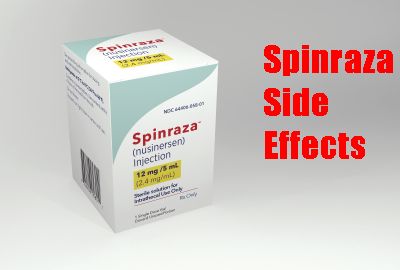Spinraza Side Effects. Last month, the Food and Drug Administration (FDA) approved the use of Spinraza as the first ever drug to “treat children and adults with spinal muscular atrophy”.

In announcing the new drug treatment, Dr. Billy Dunn, director of the agency’s Division of Neurology Products had this to say:
There has been a long-standing need for a treatment for spinal muscular atrophy, the most common genetic cause of death in infants, and a disease that can affect people at any stage of life. As shown by our suggestion to the sponsor to analyze the results of the study earlier than planned, the FDA is committed to assisting with the development and approval of safe and effective drugs for rare diseases and we worked hard to review this application quickly; we could not be more pleased to have the first approved treatment for this debilitating disease.
What are the serious Spinraza side effects that patients should be aware of? Also, what are the most common Spinraza side effects?
According to the prescribing information for the drug, the following are the most common side effects:
- Lower respiratory infection (includes pneumonia, bronchiolitis, pneumonia viral, respiratory syncytial virus bronchiolitis, lower respiratory tract infection, pneumonia bacterial, bronchitis, bronchitis viral, pneumonia moraxella, pneumonia parainfluenzae viral, lower respiratory tract infection viral, lung infection, pneumonia influenza, pneumonia pseudomonal, and pneumonia respiratory syncytial viral)
- Upper respiratory infection (includes upper respiratory tract infection, nasopharyngitis, rhinitis, pharyngitis, or tracheitis)
- Constipation
- Teething
- Upper respiratory tract congestion
- Aspiration
- Ear infection
- Scoliosis
Meantime, the serious Spinraza side effects are as follows:
- Thrombocytopenia and Coagulation Abnormalities
- Renal Toxicity
Here are some details about the above serious side effects according to Biogen (biogen.com) which markets the drug:
Increased risk of bleeding complications has been observed after administration of similar medicines. Your healthcare provider should perform blood tests at baseline and before each dose of SPINRAZA to monitor for early signs of these risks. Seek medical attention if unexpected bleeding occurs.
Increased risk of kidney damage, including potentially fatal acute inflammation of the kidney, has been observed after administration of similar medicines. Your healthcare provider should perform urine testing at baseline and before each dose of SPINRAZA to monitor for early signs of this risk.
The following section is for those of you who want more details about the serious Spinraza side effects of thrombocytopenia and renal toxicity:
Thrombocytopenia and Coagulation Abnormalities: Coagulation abnormalities and thrombocytopenia, including acute severe thrombocytopenia, have been observed after administration of some antisense oligonucleotides.
In a clinical study, 6 of 56 (11%) SPINRAZA-treated patients with normal or above normal platelet levels at baseline developed a platelet level below the lower limit of normal, compared to 0 of 28 sham-procedure control patients.
No patient had a platelet count less than 50,000 cells per microliter in this study and no patient developed a sustained low platelet count despite continued drug exposure.
Because of the risk of thrombocytopenia and coagulation abnormalities from SPINRAZA, patients may be at increased risk of bleeding complications.
Perform a platelet count and coagulation laboratory testing at baseline and prior to each administration of SPINRAZA and as clinically needed.
Renal Toxicity: Renal toxicity, including potentially fatal glomerulonephritis, has been observed after administration of some antisense oligonucleotides. SPINRAZA is present in and excreted by the kidney.
In a clinical study (mean treatment exposure 7 months), 17 of 51 (33%) SPINRAZA-treated patients had elevated urine protein, compared to 5 of 25 (20%) sham-control patients. In a group of later-onset SMA patients (mean treatment exposure 34 months), 36 of 52 (69%) had elevated urine protein.
No elevations in serum creatinine or cystatin C were observed in these studies. Conduct quantitative spot urine protein testing (preferably using a first morning urine specimen) at baseline and prior to each dose of SPINRAZA.
For urinary protein concentration greater than 0.2 g/L, consider repeat testing and further evaluation.
Spinraza is marketed by Biogen and was developed by Ionis Pharmaceuticals.
